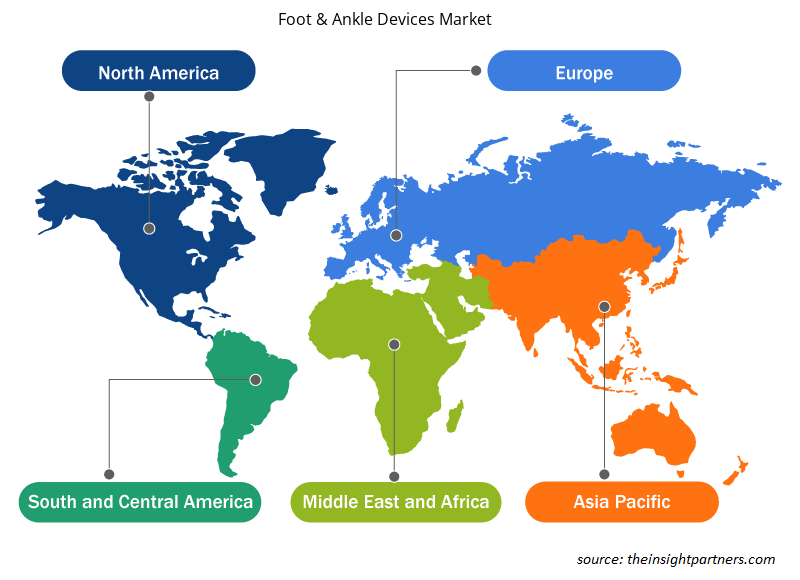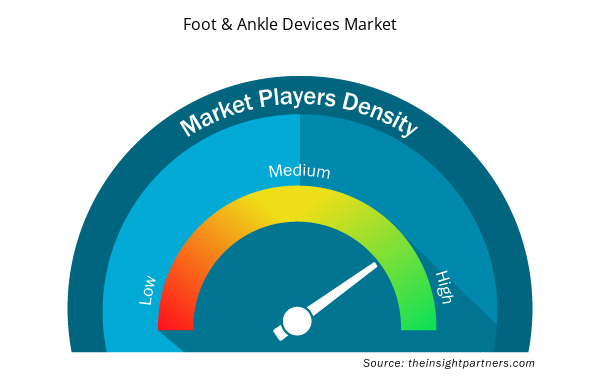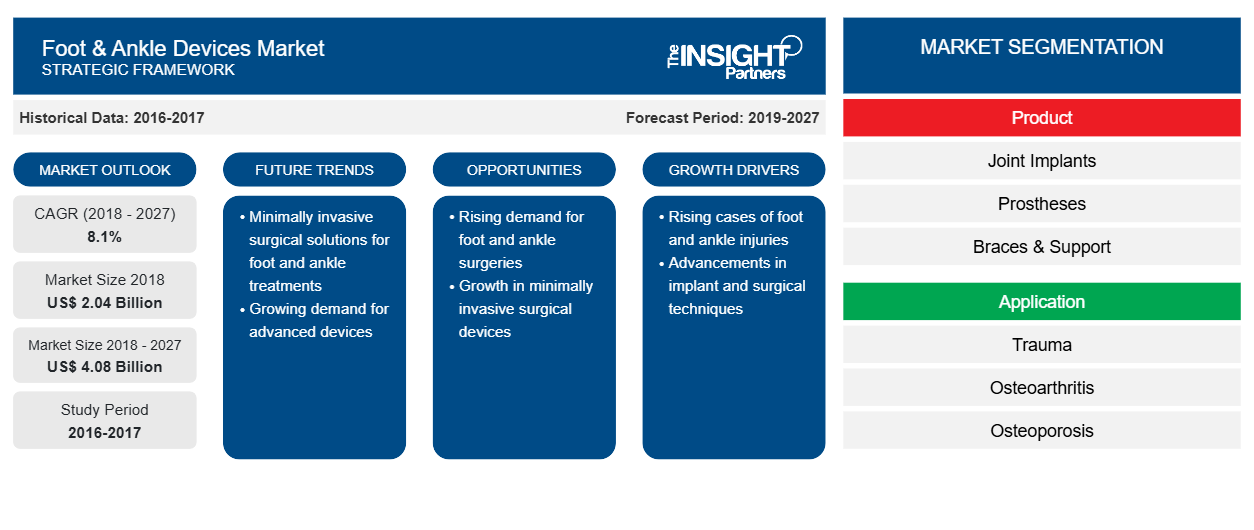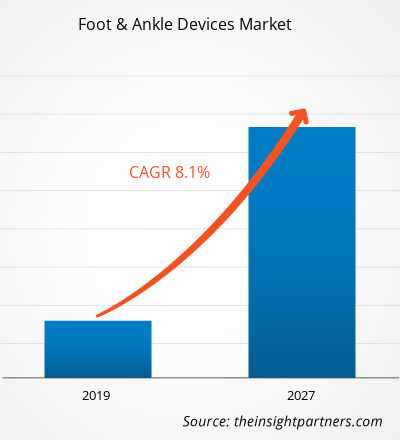[Forschungsbericht] Der Markt für Fuß- und Knöchelgeräte wurde im Jahr 2018 auf 2.038,24 Millionen US-Dollar geschätzt und soll im Jahr 2027 4.084,97 Millionen US-Dollar erreichen; von 2019 bis 2027 wird ein durchschnittliches jährliches Wachstum von 8,1 % erwartet.
Fuß- und Knöchelgeräte werden zur Behandlung von Verletzungen und Erkrankungen im Fuß- und Knöchelbereich mit oder ohne chirurgische Eingriffe eingesetzt. Unfälle und Stürze verursachen in der Regel Verletzungen im Fuß- und Knöchelbereich. Andererseits sind Arthritis, Ballenzehen, Hammerzehen und diabetischer Fuß einige der Erkrankungen, die chirurgische Eingriffe mit anschließender Verwendung von Fuß- und Knöchelgeräten erfordern können. Das Wachstum des globalen Marktes für Fuß- und Knöchelgeräte ist auf die zunehmende Zahl von Sportverletzungen, Verkehrsunfällen und orthopädischen Operationen zurückzuführen. Der Hauptfaktor, der das Marktwachstum behindert, ist jedoch die mangelnde Erstattung orthopädischer Eingriffe.
Der globale Markt für Fuß- und Knöchelgeräte wird nach der Pandemie voraussichtlich ein erhebliches Wachstum verzeichnen. COVID-19 hat die Wirtschaft und Industrie in verschiedenen Ländern aufgrund von Lockdowns, Reiseverboten und Betriebsschließungen beeinträchtigt. Die COVID-19-Krise hat die öffentlichen Gesundheitssysteme in vielen Ländern überlastet und den starken Bedarf an nachhaltigen Investitionen in Gesundheitssysteme hervorgehoben. Mit Fortschreiten der COVID-19-Pandemie wird für die Gesundheitsbranche ein Wachstumsrückgang erwartet. Das Segment Biowissenschaften floriert aufgrund der gestiegenen Nachfrage nach In-vitro-Diagnostikprodukten und der weltweit steigenden Forschungs- und Entwicklungsaktivitäten. Das Segment Medizintechnik und Bildgebung verzeichnet jedoch einen Umsatzrückgang aufgrund einer geringeren Anzahl durchgeführter Operationen und einer verzögerten oder verzögerten Gerätebeschaffung. Darüber hinaus wird erwartet, dass virtuelle Konsultationen durch medizinisches Fachpersonal nach der Pandemie zum gängigen Modell der Gesundheitsversorgung werden. Da die Telemedizin die Gesundheitsversorgung verändert, wird die digitale Gesundheit in den kommenden Jahren weiter florieren. Darüber hinaus wird erwartet, dass unterbrochene klinische Studien und die daraus resultierende Verzögerung der Markteinführung von Medikamenten in Zukunft den Weg für vollständig virtuelle Studien ebnen werden. Es wird erwartet, dass neue Technologien wie mRNA auftauchen und die Pharmaindustrie verändern werden, und es wird erwartet, dass der Markt in den kommenden Jahren auch eine stärkere vertikale Integration und mehr Joint Ventures erleben wird.
Passen Sie diesen Bericht Ihren Anforderungen an
Sie erhalten kostenlos individuelle Anpassungen an jedem Bericht, einschließlich Teilen dieses Berichts oder einer Analyse auf Länderebene, eines Excel-Datenpakets sowie tolle Angebote und Rabatte für Start-ups und Universitäten.
- Holen Sie sich die wichtigsten Markttrends aus diesem Bericht.Dieses KOSTENLOSE Beispiel umfasst eine Datenanalyse von Markttrends bis hin zu Schätzungen und Prognosen.
Markteinblicke
Zunahme der Anzahl orthopädischer Operationen treibt das Wachstum des globalen Marktes für Fuß- und Knöchelgeräte voran
Der Anstieg der orthopädischen Operationen ist in erster Linie auf die steigende Zahl der Operationen zum Ersatz von Knie- und Hüftgelenken zurückzuführen. Die Operationen werden auch bei Amputationen von Gliedmaßen aufgrund von Schäden und Verletzungen durch Unfälle oder andere Krankheiten durchgeführt. Laut der US-Behörde für Gesundheitsforschung und -qualität werden in den Vereinigten Staaten jährlich etwa 600.000 Knieersatzoperationen durchgeführt.
Knieersatzoperationen werden bei geriatrischen Menschen durchgeführt, um ihre sich verschlechternden Gelenke zu behandeln. Knieersatzoperationen gehören zu den am häufigsten durchgeführten orthopädischen Operationen. Der Anstieg von Erkrankungen wie rheumatoider Arthritis (RA), ankylosierender Spondylitis (AS) und Osteoporose hat zu einer erhöhten Zahl orthopädischer Operationen geführt. Laut einem 2018 von Healthline Media veröffentlichten Bericht erkranken beispielsweise jährlich 41 von 100.000 Menschen an rheumatoider Arthritis (RA), und etwa 1,3 Millionen Amerikaner haben RA. Ebenso besagen Daten der Spondylitis Association of America, dass in Amerika etwa 2,7 Millionen Menschen an Spondyloarthritis leiden, also 1 von 100 Einwohnern. Und gemäß Schätzungen der International Osteoporosis Foundation waren im Jahr 2018 weltweit fast 200 Millionen Frauen von Osteoporose betroffen. Davon sind etwa ein Zehntel der Frauen über 60 Jahre alt, etwa ein Fünftel der Frauen über 70 Jahre, zwei Fünftel der Frauen über 80 Jahre und zwei Drittel der Frauen über 90 Jahre.
Darüber hinaus wird erwartet, dass die Zahl der Operationen bei Muskel-Skelett-Erkrankungen, die mit Sport, Arbeitsunfällen und altersbedingten Funktionsstörungen in Zusammenhang stehen, steigen wird. Laut der Arthritis Foundation wurden beispielsweise im Jahr 2017 etwa 54 Millionen Erwachsene mit Arthritis diagnostiziert. Außerdem leiden fast 300.000 Babys und Kinder an Arthritis oder einer rheumatischen Erkrankung. Die häufigste diagnostizierte Arthritisart ist Osteoarthritis, von der etwa 31 Millionen Amerikaner betroffen sind. Daher wird erwartet, dass mit der Zunahme der orthopädischen Operationen die Nachfrage nach Fuß- und Knöchelgeräten erheblich steigen wird. Daher wird ein Anstieg der orthopädischen Operationen im Prognosezeitraum wahrscheinlich den Markt für Fuß- und Knöchelgeräte ankurbeln.
Produktbasierte Erkenntnisse
In Bezug auf die Produkte ist der globale Markt für Fuß- und Knöchelgeräte in Implantate, Prothesen, Zahnspangen und Stützen sowie Fixiergeräte unterteilt. Im Jahr 2018 hatte das Segment Zahnspangen und Stützen den größten Marktanteil. Es wird jedoch geschätzt, dass das Segment Implantate im Prognosezeitraum die höchste durchschnittliche jährliche Wachstumsrate verzeichnet.
Anwendungsbasierte Erkenntnisse
In Bezug auf die Anwendung ist der globale Markt für Fuß- und Knöchelgeräte in Trauma, Osteoarthritis, Osteoporose, rheumatoide Arthritis und Hammerzehen unterteilt. Im Jahr 2018 hatte das Traumasegment den größten Marktanteil. Außerdem wird erwartet, dass dasselbe Segment im Prognosezeitraum die höchste durchschnittliche jährliche Wachstumsrate verzeichnet.
Die Akteure auf dem globalen Markt für Fuß- und Knöchelgeräte verfolgen Strategien zur Produkteinführung und -erweiterung, um den sich weltweit ändernden Kundenanforderungen gerecht zu werden und so ihren Markennamen weltweit zu wahren.
Fuß- und Knöchelgeräte
Regionale Einblicke in den Markt für Fuß- und Knöchelgeräte
Die regionalen Trends und Faktoren, die den Markt für Fuß- und Knöchelgeräte während des Prognosezeitraums beeinflussen, wurden von den Analysten von Insight Partners ausführlich erläutert. In diesem Abschnitt werden auch die Marktsegmente und die Geografie für Fuß- und Knöchelgeräte in Nordamerika, Europa, im asiatisch-pazifischen Raum, im Nahen Osten und Afrika sowie in Süd- und Mittelamerika erörtert.

- Erhalten Sie regionale Daten zum Markt für Fuß- und Knöchelgeräte
Umfang des Marktberichts zu Fuß- und Knöchelgeräten
| Berichtsattribut | Details |
|---|---|
| Marktgröße im Jahr 2018 | 2,04 Milliarden US-Dollar |
| Marktgröße bis 2027 | 4,08 Milliarden US-Dollar |
| Globale CAGR (2018 - 2027) | 8,1 % |
| Historische Daten | 2016-2017 |
| Prognosezeitraum | 2019–2027 |
| Abgedeckte Segmente | Nach Produkt
|
| Abgedeckte Regionen und Länder | Nordamerika
|
| Marktführer und wichtige Unternehmensprofile |
|
Dichte der Marktteilnehmer für Fuß- und Knöchelgeräte: Die Auswirkungen auf die Geschäftsdynamik verstehen
Der Markt für Fuß- und Knöchelgeräte wächst rasant, angetrieben durch die steigende Nachfrage der Endnutzer aufgrund von Faktoren wie sich entwickelnden Verbraucherpräferenzen, technologischen Fortschritten und einem größeren Bewusstsein für die Vorteile des Produkts. Mit steigender Nachfrage erweitern Unternehmen ihr Angebot, entwickeln Innovationen, um die Bedürfnisse der Verbraucher zu erfüllen, und nutzen neue Trends, was das Marktwachstum weiter ankurbelt.
Die Marktteilnehmerdichte bezieht sich auf die Verteilung der Firmen oder Unternehmen, die in einem bestimmten Markt oder einer bestimmten Branche tätig sind. Sie gibt an, wie viele Wettbewerber (Marktteilnehmer) in einem bestimmten Marktraum im Verhältnis zu seiner Größe oder seinem gesamten Marktwert präsent sind.
Die wichtigsten auf dem Markt für Fuß- und Knöchelgeräte tätigen Unternehmen sind:
- Smith & Neffe
- Wright Medicalgroup NV
- Stryker
- Anthrex Inc.
- Zimmer Biomet
Haftungsausschluss : Die oben aufgeführten Unternehmen sind nicht in einer bestimmten Reihenfolge aufgeführt.

- Überblick über die wichtigsten Akteure auf dem Markt für Fuß- und Knöchelgeräte
Globaler Markt für Fuß- und Knöchelgeräte – nach Produkt
- Gelenkimplantate
- Knöchel- und Subtalarimplantate
- Phalangealimplantate
- Prothesen
- Dynamische Reaktion
- Mikroprozessorgesteuert
- Fester, gepolsterter Knöchelabsatz
- Ein- und mehraxial
- Zahnspangen & Stützen
- Scharnierspangen
- Weiche Zahnspangen
- Fixiervorrichtungen
- Externe Fixierungsgeräte
- Einseitig
- Ring Knöchel
- Hybrid
- Interne Fixierungsgeräte
- Schrauben und Nägel
- Platten
Globaler Markt für Fuß- und Knöchelgeräte – nach Anwendung
- Trauma
- Arthrose
- Osteoporose
- Rheumatoide Arthritis (RA)
- Hammerzehe
Fuß- und Knöchelgeräte
- Historische Analyse (2 Jahre), Basisjahr, Prognose (7 Jahre) mit CAGR
- PEST- und SWOT-Analyse
- Marktgröße Wert/Volumen – Global, Regional, Land
- Branche und Wettbewerbsumfeld
- Excel-Datensatz



Report Coverage
Revenue forecast, Company Analysis, Industry landscape, Growth factors, and Trends

Segment Covered
This text is related
to segments covered.

Regional Scope
North America, Europe, Asia Pacific, Middle East & Africa, South & Central America

Country Scope
This text is related
to country scope.
Häufig gestellte Fragen
The global foot & ankle devices market players square measure adopting the product launch and growth ways to cater to dynamical client demands worldwide, that additionally permits them to take care of their name globally.
According to inflammatory disease Foundation, in 2017, roughly 54 million adults are diagnosed with arthritis and nearly 3 lakhs babies and children have arthritis or a rheumatic condition. Hence, with a rise within the orthopedic surgeries, the demand for foot & ankle devices is anticipated to extend significantly. Thus, an increase in orthopedic surgeries is probably going to drive the marketplace for foot & ankle devices within the forecast amount.
Foot and ankle devices used to heal injuries and disorders within the foot and ankle region with or without the assistance of surgical procedures. Accidents and fall sometimes cause injuries within the foot and ankle region. On another hand, arthritis, bunions, hammer-toes, and diabetic foot are a number of disorders which can require surgical procedures with serial use of foot and ankle devices.
In 2018, the braces & supports section command largest share of the market. However, the implants section is calculable to register the best CAGR throughout the forecast amount.
Lack of compensation for orthopedic procedures is that the major issue obstructive the market growth.
The growth of the worldwide foot & ankle devices market is attributed to the increasing incidences of sports injuries, growing incidents of road accidents and increase within the variety and number of orthopedic surgeries.
Trends and growth analysis reports related to Life Sciences : READ MORE..
The List of Companies - Foot & Ankle Devices Market
- Smith & Nephew
- Wright Medicalgroup N.V
- Stryker
- Anthrex Inc.
- Zimmer Biomet
- Ossur
- Integra Lifesciences Corporation
- J&J (Depuy Synthes)
- Acumed, LLC
- Extremity Medical, LLC
The Insight Partners performs research in 4 major stages: Data Collection & Secondary Research, Primary Research, Data Analysis and Data Triangulation & Final Review.
- Data Collection and Secondary Research:
As a market research and consulting firm operating from a decade, we have published and advised several client across the globe. First step for any study will start with an assessment of currently available data and insights from existing reports. Further, historical and current market information is collected from Investor Presentations, Annual Reports, SEC Filings, etc., and other information related to company’s performance and market positioning are gathered from Paid Databases (Factiva, Hoovers, and Reuters) and various other publications available in public domain.
Several associations trade associates, technical forums, institutes, societies and organization are accessed to gain technical as well as market related insights through their publications such as research papers, blogs and press releases related to the studies are referred to get cues about the market. Further, white papers, journals, magazines, and other news articles published in last 3 years are scrutinized and analyzed to understand the current market trends.
- Primary Research:
The primarily interview analysis comprise of data obtained from industry participants interview and answers to survey questions gathered by in-house primary team.
For primary research, interviews are conducted with industry experts/CEOs/Marketing Managers/VPs/Subject Matter Experts from both demand and supply side to get a 360-degree view of the market. The primary team conducts several interviews based on the complexity of the markets to understand the various market trends and dynamics which makes research more credible and precise.
A typical research interview fulfils the following functions:
- Provides first-hand information on the market size, market trends, growth trends, competitive landscape, and outlook
- Validates and strengthens in-house secondary research findings
- Develops the analysis team’s expertise and market understanding
Primary research involves email interactions and telephone interviews for each market, category, segment, and sub-segment across geographies. The participants who typically take part in such a process include, but are not limited to:
- Industry participants: VPs, business development managers, market intelligence managers and national sales managers
- Outside experts: Valuation experts, research analysts and key opinion leaders specializing in the electronics and semiconductor industry.
Below is the breakup of our primary respondents by company, designation, and region:

Once we receive the confirmation from primary research sources or primary respondents, we finalize the base year market estimation and forecast the data as per the macroeconomic and microeconomic factors assessed during data collection.
- Data Analysis:
Once data is validated through both secondary as well as primary respondents, we finalize the market estimations by hypothesis formulation and factor analysis at regional and country level.
- Macro-Economic Factor Analysis:
We analyse macroeconomic indicators such the gross domestic product (GDP), increase in the demand for goods and services across industries, technological advancement, regional economic growth, governmental policies, the influence of COVID-19, PEST analysis, and other aspects. This analysis aids in setting benchmarks for various nations/regions and approximating market splits. Additionally, the general trend of the aforementioned components aid in determining the market's development possibilities.
- Country Level Data:
Various factors that are especially aligned to the country are taken into account to determine the market size for a certain area and country, including the presence of vendors, such as headquarters and offices, the country's GDP, demand patterns, and industry growth. To comprehend the market dynamics for the nation, a number of growth variables, inhibitors, application areas, and current market trends are researched. The aforementioned elements aid in determining the country's overall market's growth potential.
- Company Profile:
The “Table of Contents” is formulated by listing and analyzing more than 25 - 30 companies operating in the market ecosystem across geographies. However, we profile only 10 companies as a standard practice in our syndicate reports. These 10 companies comprise leading, emerging, and regional players. Nonetheless, our analysis is not restricted to the 10 listed companies, we also analyze other companies present in the market to develop a holistic view and understand the prevailing trends. The “Company Profiles” section in the report covers key facts, business description, products & services, financial information, SWOT analysis, and key developments. The financial information presented is extracted from the annual reports and official documents of the publicly listed companies. Upon collecting the information for the sections of respective companies, we verify them via various primary sources and then compile the data in respective company profiles. The company level information helps us in deriving the base number as well as in forecasting the market size.
- Developing Base Number:
Aggregation of sales statistics (2020-2022) and macro-economic factor, and other secondary and primary research insights are utilized to arrive at base number and related market shares for 2022. The data gaps are identified in this step and relevant market data is analyzed, collected from paid primary interviews or databases. On finalizing the base year market size, forecasts are developed on the basis of macro-economic, industry and market growth factors and company level analysis.
- Data Triangulation and Final Review:
The market findings and base year market size calculations are validated from supply as well as demand side. Demand side validations are based on macro-economic factor analysis and benchmarks for respective regions and countries. In case of supply side validations, revenues of major companies are estimated (in case not available) based on industry benchmark, approximate number of employees, product portfolio, and primary interviews revenues are gathered. Further revenue from target product/service segment is assessed to avoid overshooting of market statistics. In case of heavy deviations between supply and demand side values, all thes steps are repeated to achieve synchronization.
We follow an iterative model, wherein we share our research findings with Subject Matter Experts (SME’s) and Key Opinion Leaders (KOLs) until consensus view of the market is not formulated – this model negates any drastic deviation in the opinions of experts. Only validated and universally acceptable research findings are quoted in our reports.
We have important check points that we use to validate our research findings – which we call – data triangulation, where we validate the information, we generate from secondary sources with primary interviews and then we re-validate with our internal data bases and Subject matter experts. This comprehensive model enables us to deliver high quality, reliable data in shortest possible time.


 Holen Sie sich ein kostenloses Muster für diesen Bericht
Holen Sie sich ein kostenloses Muster für diesen Bericht